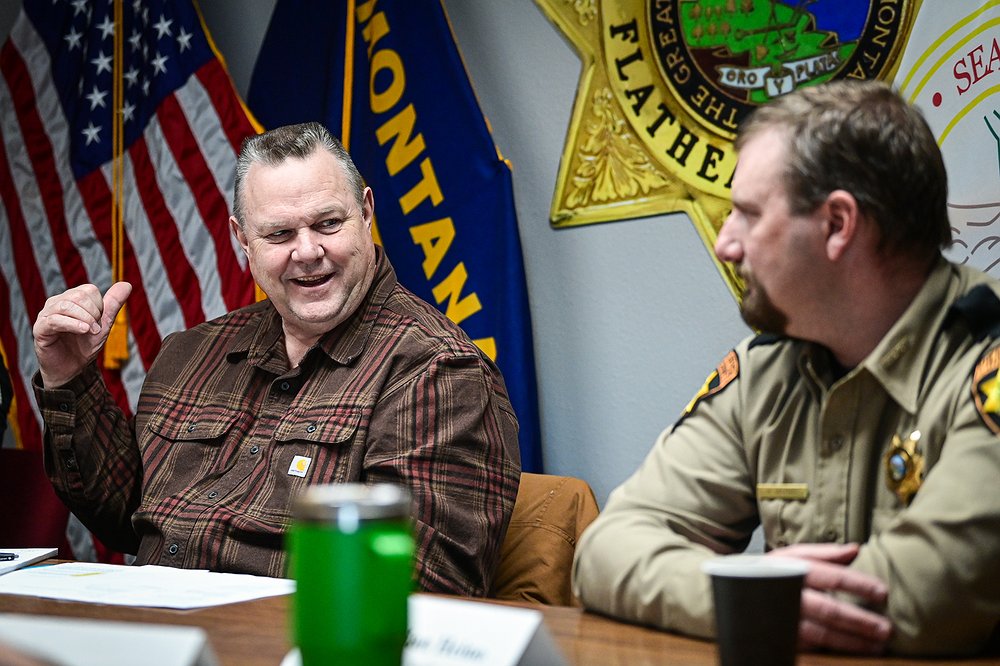Tester talks crime, drugs and border with Flathead law enforcement officials
U.S. Sen. Jon Tester met with law enforcement officials from Flathead and Lincoln counties in Kalispell on Friday to discuss crime prevention, fentanyl interdiction and border security efforts.
The three-term Democrat — who is running for reelection this year — joined a roundtable discussion March 15 that included Flathead County Sheriff Brian Heino, Lincoln County Sheriff Darren Short, Columbia Falls Police Chief Clint Peters, Kalispell Police Chief Jordan Venezio, Deputy Chief Kevin Conway of the Whitefish Police Department and members of the Northwest Montana Drug Task Force. The gathering was held in the Flathead County Sheriff’s Office.
Ahead of his trip to Kalispell, Tester touted his work in Congress to clamp down on the illicit supply of fentanyl, including co-sponsoring the FEND Off Fentanyl Act, which the Senate passed as part of a national security package in February.
The legislation, stalled in the U.S. House, would require the White House to sanction leaders of drug cartels suspected of ferrying the synthetic opioid into the country and give the Treasury Department new tools to crack down on fentanyl-related money laundering, according to media reports.
Montana Attorney General Austin Knudsen on March 6 said that the state had seen a more than 20,000% increase in fentanyl seizures since 2019. The Montana State Crime Lab saw about 80 reported overdose deaths involving fentanyl in 2023, which Knudsen said represented a 1,900% increase from 2017.
Tester also touted his support of a bipartisan package of appropriations bills aimed at preventing a government shutdown that included funding meant to bolster law enforcement. The roughly $467.5 billion spending bill passed the Senate with a 75-22 vote on March 8.
The legislation included $1.59 billion in grants supporting police departments and sheriff’s offices, $664.5 million for COPS grants to help hire new law enforcement officers and $600 million for the Bureau of Indian Affairs Tribal Law Enforcement and Justice services.
It also budgets $189 million for the U.S. Department of Justice’s Comprehensive Opioid and Substance Use Disorder Program and $547 million for organized crime and drug enforcement task forces.
 U.S. Senator Jon Tester speaks during a roundtable discussion on crime prevention, fentanyl trafficking and border security efforts with Flathead County Sheriff Brian Heino, right, Whitefish Police Deputy Chief Kevin Conway, Kalispell Police Chief Jordan Venizio, Lincoln County Sheriff Darren Short and Columbia Falls Police Chief Clint Peters at the Flathead County Sheriff's Office in Kalispell on Friday, March 15. (Casey Kreider/Daily Inter Lake)
U.S. Senator Jon Tester speaks during a roundtable discussion on crime prevention, fentanyl trafficking and border security efforts with Flathead County Sheriff Brian Heino, right, Whitefish Police Deputy Chief Kevin Conway, Kalispell Police Chief Jordan Venizio, Lincoln County Sheriff Darren Short and Columbia Falls Police Chief Clint Peters at the Flathead County Sheriff's Office in Kalispell on Friday, March 15. (Casey Kreider/Daily Inter Lake)Casey Kreider



